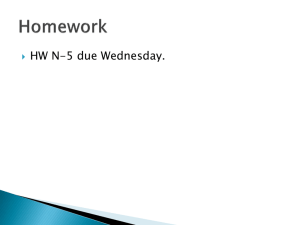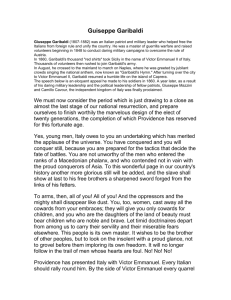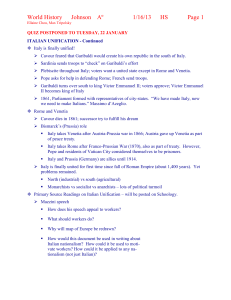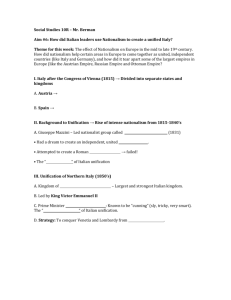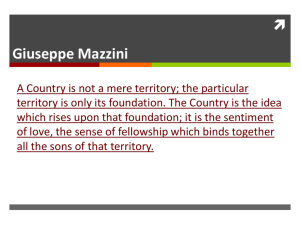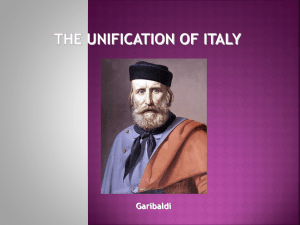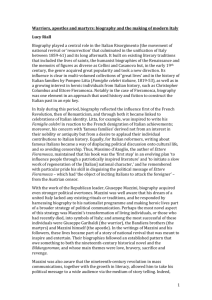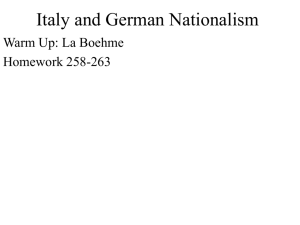File
advertisement
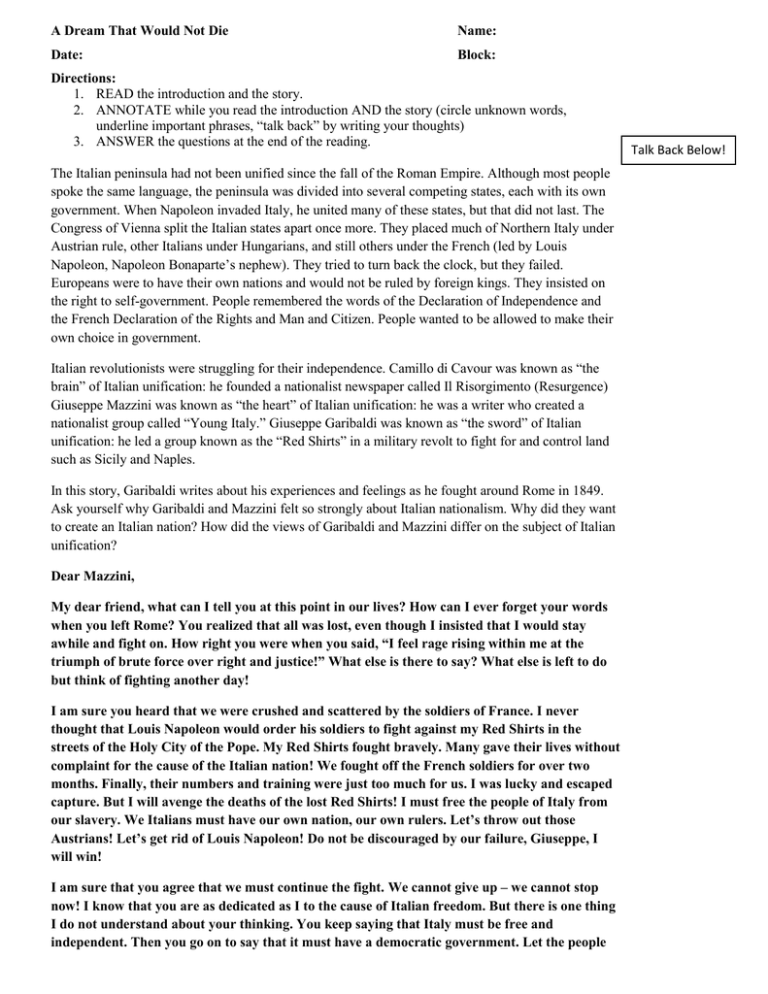
A Dream That Would Not Die Name: Date: Block: Directions: 1. READ the introduction and the story. 2. ANNOTATE while you read the introduction AND the story (circle unknown words, underline important phrases, “talk back” by writing your thoughts) 3. ANSWER the questions at the end of the reading. The Italian peninsula had not been unified since the fall of the Roman Empire. Although most people spoke the same language, the peninsula was divided into several competing states, each with its own government. When Napoleon invaded Italy, he united many of these states, but that did not last. The Congress of Vienna split the Italian states apart once more. They placed much of Northern Italy under Austrian rule, other Italians under Hungarians, and still others under the French (led by Louis Napoleon, Napoleon Bonaparte’s nephew). They tried to turn back the clock, but they failed. Europeans were to have their own nations and would not be ruled by foreign kings. They insisted on the right to self-government. People remembered the words of the Declaration of Independence and the French Declaration of the Rights and Man and Citizen. People wanted to be allowed to make their own choice in government. Italian revolutionists were struggling for their independence. Camillo di Cavour was known as “the brain” of Italian unification: he founded a nationalist newspaper called Il Risorgimento (Resurgence) Giuseppe Mazzini was known as “the heart” of Italian unification: he was a writer who created a nationalist group called “Young Italy.” Giuseppe Garibaldi was known as “the sword” of Italian unification: he led a group known as the “Red Shirts” in a military revolt to fight for and control land such as Sicily and Naples. In this story, Garibaldi writes about his experiences and feelings as he fought around Rome in 1849. Ask yourself why Garibaldi and Mazzini felt so strongly about Italian nationalism. Why did they want to create an Italian nation? How did the views of Garibaldi and Mazzini differ on the subject of Italian unification? Dear Mazzini, My dear friend, what can I tell you at this point in our lives? How can I ever forget your words when you left Rome? You realized that all was lost, even though I insisted that I would stay awhile and fight on. How right you were when you said, “I feel rage rising within me at the triumph of brute force over right and justice!” What else is there to say? What else is left to do but think of fighting another day! I am sure you heard that we were crushed and scattered by the soldiers of France. I never thought that Louis Napoleon would order his soldiers to fight against my Red Shirts in the streets of the Holy City of the Pope. My Red Shirts fought bravely. Many gave their lives without complaint for the cause of the Italian nation! We fought off the French soldiers for over two months. Finally, their numbers and training were just too much for us. I was lucky and escaped capture. But I will avenge the deaths of the lost Red Shirts! I must free the people of Italy from our slavery. We Italians must have our own nation, our own rulers. Let’s throw out those Austrians! Let’s get rid of Louis Napoleon! Do not be discouraged by our failure, Giuseppe, I will win! I am sure that you agree that we must continue the fight. We cannot give up – we cannot stop now! I know that you are as dedicated as I to the cause of Italian freedom. But there is one thing I do not understand about your thinking. You keep saying that Italy must be free and independent. Then you go on to say that it must have a democratic government. Let the people Talk Back Below! rule, you say. Fine… but what if the people are not ready to govern themselves? What if the people know nothing about making their own laws at this time? How many successful democracies do you see in Europe? What difference does it make what kind of government Italy has, as long as it’s Italian? Would you agree to support the new king, Victor Emmanuel? Can’t you see that we must have someone in office to whom we can turn? Victor Emmanuel can be the head of a united Italy! Giuseppe, back in the old days, you were the fighter! Nothing bothered you. You had one purpose in life: the creation of the nation of Italy. Remember your slogan: “Unity and Independence”? Remember how you swore an oath to your brotherhood of Young Italy? Your life was to be given to the cause of Italian independence. Here’s our chance, Giuseppe; let’s gain our independence first! Liberty and equality must follow! Don’t give up the fight now. Join with me once again in the fight to make Italy free! I have no idea when we will meet again. But I pray that it will be on an Italian battlefield! Italy will live again! Your friend in freedom, Giuseppe Garibaldi In battle, Garibaldi was not afraid to tell his soldiers, “We are going to die, but Italy will win the day. Viva Italia!” On one occasion, he was slightly wounded when several bullets hit his leg. He refused to take the time to have the wound treated, and his only complaint was that he did not have another pair of pants with him. Soldiers followed him without hesitation into battle. In 1860, Garibaldi conquered the island of Sicily and the kingdom of Naples – he could have become a king himself, but he encouraged the people and Italian parliament to vote for Victor Emmanuel. Italy became a constitutional monarchy with a constitution, parliament, and limited powers for the king. Understanding the Story: Write T for each TRUE statement and O for each OPINION. 1. 2. 3. 4. 5. 6. 7. _____ Garibaldi worked to create an Italian nation. _____ Garibaldi was the greatest Italian leader. _____ Garibaldi’s Red Shirt fought bravely. _____ Mazzini wanted a democratic government. _____ Mazzini believed Italy had to be free and independent. _____ Garibaldi should not have given up his power to Victor Emmanuel. _____ The Congress of Vienna made a wise decision to keep Italian states broken up. Questions for Review: Answer the following questions on a separate sheet of paper. 1. Who was the first to unite some of the Italian states since the fall of the Roman Empire? Who split them apart once more? 2. What happened in the first battle between Garibaldi and Louis Napoleon of France? 3. Why did Garibaldi feel so strongly about Italian nationalism/unification? 4. How did the views of Garibaldi and Mazzini differ on the subject of Italian nationalism? 5. Why do you think Garibaldi gave his power over to Victor Emmanuel? Activities: Choose one of the following to complete. 1. Draw a cartoon showing Mazzini and Garibaldi working to turn a group of Italian states into an Italian nation. Give your cartoon a title. 2. Imagine that you are Mazzini. Write a response to Garibaldi’s letter telling him how you feel about the future of Italy. 3. Many historians believe that Garibaldi was a great leader. Make a list of the abilities you believe a great leader should have. Alongside each, indicate whether Garibaldi met this requirement.
